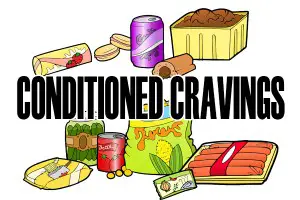Have you ever eaten too much and experienced a “food hangover”: suddenly feeling sick and tired? Previously, it was thought that it was caused by indigestion – the gastrointestinal tract not being able to keep up with how much calories, protein or sugars you have consumed.
New research, however, has shown that there is more to this.
Feeling bad after eating is actually your body sending you a strong signal: what you ate is not good for you, and you probably were tricked into eating it in the first place.
Professor Fred Provenza at Utah State University has been studying animal feeding habits and behaviors for three decades. In his research Dr. Provenza discovered that it was possible to condition an animal to crave a particular food, for example a weed that would have more nutritional value. What he found to be true for animals, he believes to be the same for humans.
It is natural for animals to crave healthy foods for their nutritional needs and adapt to when these needs change; they find the food that is healthy for them at that time to be palatable.
How Animals Use Palatability to Eat Healthy
Dr. Provenza’s research changed the way science think about palatability. For a food to be palatable, it means it is “pleasant or acceptable to the taste and hence fit to be eaten or drunk,” writes the professor. Palatability helps animals to choose what their bodies need by flavors.
In his studies, Provenza found that when an animal is low or a specific vitamin or mineral, it will search for the food that will replenish it.
Animals use flavors to guide them to the right foods. In one of his studies, Dr. Provenza separated animals into two groups, one group was given nutritionally poor food, straw, with maple flavor, the second group was given straw with apple flavor.
The next day, the flavors were switched, and then the animals received nutrients through a tube. After this experiment each animal group showed a strong preference towards the flavor after which they received the nutrients. They started to associate nutrients with that flavor.
Healthy foods taste good to animals, but most humans have drifted away from that ability to discern what is good for us. Why do we crave foods with poor nutritional values, high fat and sugar content and known chemicals?
We have become disconnected from our roots.
Why Do Humans Crave Bad Foods?
 Today most of us are far away from the lands of our ancestors. We are living in cities, disconnected from nature. We are used to processed foods that are full of artificial flavors. According to Dr. Provenza, all of these factors have robbed us from our natural ability to tell what our bodies need.
Today most of us are far away from the lands of our ancestors. We are living in cities, disconnected from nature. We are used to processed foods that are full of artificial flavors. According to Dr. Provenza, all of these factors have robbed us from our natural ability to tell what our bodies need.
Just like a study showed that animals associate flavors with nutrients, so do humans; and it is something that can be conditioned. When we eat processed foods with strong artificial flavors and refined sugars, after a while our bodies start to associate these flavors with the initial energy kick created by the sugars.
After time these synthetic flavors become more and more desirable, and our bodies start craving them. That brings the cycle of overeating: craving processed foods because our minds have been tricked into thinking they will fulfill our nutritional needs, feeling even more malnourished, craving more bad foods and overeating in an effort to revive enough nutrients. Dr. Provenza believes that this is just one of the possible causes of obesity, according to Vox.
What is Negative Post-Ingestive Feedback?
Dr. Provenza believes that all living creatures inherit “nutritional wisdom.” After eating the body gives you signals about the nutrient content of what you just ate, also called post-ingestive feedback. If you feel well, the body received what it needed. If you experience a negative post-ingestive feedback (also known as food hangover or food coma) by feeling nauseous, fatigued, or generally malaise, the body is telling you it is either lacking nutrients, or received an excess of toxins, or both.
Therefore, this type of research shows us that food hangovers have nothing to do with overeating (have you ever felt poor from eating too much vegetables?) and everything the poor nutritional content of these foods.
Dr. Provenza recommends everyone to be more mindful of what signals our bodies send us, to pay attention to how we feel after eating, and commit to eating wholesome foods. After some time, feeling good will condition us to associate that with good food – and our cravings will take a healthier turn.
Thanks for installing the Bottom of every post plugin by Corey Salzano. Contact me if you need custom WordPress plugins or website design.






